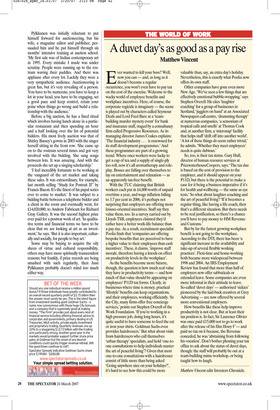A duvet day’s as good as a pay rise
Matthew Vincent
Ever wanted to kill your boss? Well, now you can — and, as long as it doesn’t become a regular occurrence, you won’t even have to pay tax on the cost of the exercise. Welcome to the wacky world of employee benefits and workplace incentives. Here, of course, the corporate regicide is imaginary — the scene is played out by characters called Seymour Deals and Lord Fred Bare at a ‘teambuilding murder mystery event’ for bank and insurance staff, staged by a consultancy firm called Progressive Resources. As its managing director James Coakes explains: ‘The financial industry ... is renowned for its staff development programmes.’ And these programmes are part of a growing trend. Where once workers were lucky to get a cup of tea and a supply of single-ply loo roll, now it’s all aromatherapy and roleplay. Bosses are falling over themselves to lay on entertainment and relaxation — as an apparently tax-free benefit.
With the TUC claiming that British workers each put in £4,800 worth of unpaid overtime a year, and wage inflation falling to 3.7 per cent in 2006, it’s perhaps not surprising that employers are offering more leisure-oriented incentives. Staff say they value them, too. In a survey carried out by Lloyds TSB, employees claimed they’d rather have a better work-life balance than a pay rise. As a result, recruitment specialist Poolia finds that ‘companies are offering bespoke benefits that are perceived to have a higher value to their employees than cash incentives’. These, it claims, ‘improve staff morale, therefore having a knock-on effect on productivity levels in the workplace’.
As the benefits become more bizarre, though, the question is how much real value they have in productivity terms — and how much of that value should be appearing on employees’ P11D tax forms. Clearly, in businesses where time is money, practical ‘lifestyle’ benefits can keep organisations, and their employees, working efficiently. ‘In the City, many firms offer free concierge services,’ points out Stephen Overell of the Work Foundation. ‘If you’re working in a high pressure job, doing long hours, it’s quite useful to have someone to feed the cat or iron your shirts. Goldman Sachs even provides hairdressers.’ But what about visits from hairdressers who call themselves ‘urban therapy’ specialists, and hold ‘one-toone consultations to help individuals master the art of peaceful living’? Given that most one-to-one consultations with a hairdresser consist of little more than being asked ‘Going anywhere nice on your holidays?’, it’s hard to see how this could be more valuable than, say, an extra day’s holiday. Nevertheless, this is exactly what Poolia now offers its own staff.
Other companies have gone even more New Age. ‘We’ve seen a few things that are effectively emotional bubble-wrapping,’ says Stephen Overell. He cites ‘laughter coaching’ for a group of businesses in Scotland, ‘jugglers on hand’ at an Associated Newspapers call centre, ‘drumming therapy’ at numerous companies, ‘a sensorium of tropical calls and smells’ at Thomas Cook and, at another firm, a ‘micronap’ facility that helps staff ‘drift off into another world’. ‘A lot of these things do seem rather trivial,’ he admits. ‘Whether they meet employees’ needs is quite dubious.’ So, too, is their tax status. Gary Hull, director of human resource services at PricewaterhouseCoopers, says: ‘The tax due is based on the cost of provision to the employer, and it should appear on your P11D, but there is the potential to make a case for it being a business imperative if it’s for health and wellbeing — the same as eye tests.’ So what about laughter coaching and the art of peaceful living? ‘If it becomes a regular thing, like having a life coach, then that’s a different situation. But there needs to be real justification, so there’s a chance you’ll have to pay money to HM Revenue and Customs.’ But by far the fastest growing workplace benefit is not going to the workplace. According to the DTI, there has been ‘a significant increase in the availability and take-up of several flexible working practices’. Flexi-time and home-working both became more widespread between 1998 and 2004. An IRS Employment Review has found that more than half of employers now offer sabbaticals or extended leave. Some companies are even more informal in their attitude to leave. So-called ‘duvet days’ — authorised ‘sickies’ pioneered by the laid-back creatives at Grey Advertising — are now offered by several more conventional employers.
How benefits like these help improve productivity is not clear. But at least their tax position is. In fact, Sir Laurence Olivier was once paid £15,000 not to go to work after the release of his film Henry V — and paid no tax on it because, the Revenue conceded, he was ‘abstaining from following his vocation’. Don’t bother phoning your tax office to ask about the status of duvet days, though: the staff will probably be out at a team-building mime workshop, or being taught how to laugh.


















































































 Previous page
Previous page